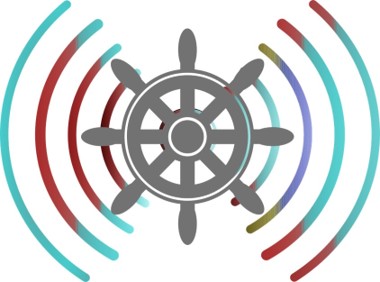Something may be up your alley or up your street, but can it be “in your wheelhouse”?
 From the small shelter on a ship where the captain steers the vessel, to a 21st-century metaphor for personal competency, “wheelhouse” has spun its own unusual tale. Manning a ship’s wheel was certainly a position of control when the term originated in the 1830s, noted A. Curzan in “In One’s Wheelhouse: From Boats, to Baseball, to …” (Lingua Franca blog, 9 September 2013). It was also associated with railroad yards where trains were maneuvered for repair on mechanical turntables which were often covered. These led to the term “roundhouse” or “wheelhouse”.
From the small shelter on a ship where the captain steers the vessel, to a 21st-century metaphor for personal competency, “wheelhouse” has spun its own unusual tale. Manning a ship’s wheel was certainly a position of control when the term originated in the 1830s, noted A. Curzan in “In One’s Wheelhouse: From Boats, to Baseball, to …” (Lingua Franca blog, 9 September 2013). It was also associated with railroad yards where trains were maneuvered for repair on mechanical turntables which were often covered. These led to the term “roundhouse” or “wheelhouse”.
But technology changes quickly, and “wheelhouse” lost traction when commercial aviation replaced the railroad as the more prevalent form of travel, according to Kevin Murnane in “Wheelhouse: How Technology Changes the Meaning of Words” (Priceonomics.com, 20 October 2015). Benefitting from faster and more efficient travel were professional sports teams, which adopted “wheelhouse” in sports parlance in the late 1950s. The word referred to an American baseball player’s “power zone” when swinging the bat, namely the area where the natural swing of the bat makes best contact with the ball to drive it hard and far.
Evolving further, the word became associated with matching a person’s skills, interests or area of specialty or competency. The expression that something is “in [someone’s] wheelhouse” now peppers business lingo, leading some to argue the term is fast becoming a cliché. Indeed, creating a metaphor from an old ship’s bridge and technological prowess may seem like trying to reinvent the linguistic wheel. But injecting the past into modern language may ensure the art of navigation is not lost among a cruise ship’s computers. Using such words adeptly should be in everyone’s wheelhouse.
Eric Schallenberg, May 2019

